
|
|
![]()
| Film Title/Year and Description of Kiss in Movie Scene | |||||||||||
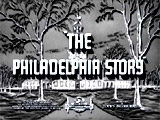
|
Director George Cukor's literate comedy, adapted from Philip Barry's Broadway play (with Hepburn reprising her stage role), told about romance among the wealthy elite in Philadelphia. During a private, outdoor conversation with rich, icy and privileged Philadelphian socialite Tracy Lord (Katharine Hepburn), tabloid Spy magazine writer Macaulay "Mike" Connor (James Stewart) argued with her about her impending marriage to stuffed shirt George Kittredge (John Howard). In an earlier exchange, he had called her arrogant and snobbish, but then he told her that she was adorable, wonderful and magnificent:
She doubted what he said: "I don't seem to you made of bronze?" He took her in his arms poolside in the moonlight:
Enjoying what she was hearing, she told him: "Shut up, shut up. Oh, Mike, keep talking, keep talking. Talk, will you?" He stopped and loosened his hold on her, but then after calling him "Professor," with their emotions sweeping them away, he impulsively and forcefully kissed her mid-sentence. She happily took his melodramatic kiss and afterwards exclaimed softly: "Golly." She took a breath and kissed him a second time. Then, she stood in his arms, her cheek against his chest, overwhelmed and amazed at herself and starting to shake, exclaiming: "Golly, Moses." |
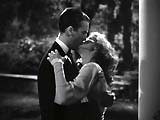 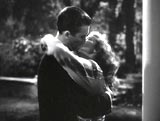 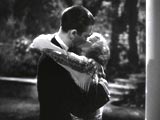
|
|||||||||
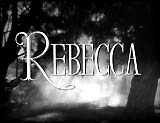
|
Alfred Hitchcock's first American film, a Best Picture winner, was based upon a Daphne du Maurier novel. It told about a damsel-in-distress, recently married to a dashing and rich lord of an ancestral manor named Manderley, who was haunted by the memory of the man's first wife - a dead woman named Rebecca. The night before a coroner's inquest into Maxim de Winter's (Laurence Olivier) first wife's drowning death, the second Mrs. de Winter (Joan Fontaine) was worried about how her husband might lose his temper at the hearing. She lovingly asked to be there at his side, as they stood together in front of the huge fireplace:
Maxim examined his new wife's face, and noticed how she had lost her youth and matured in spite of his wishes. They shared a very mature, heart-felt embrace and some kisses after he confessed to her:
|
 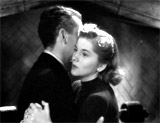 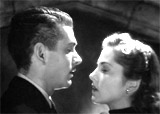 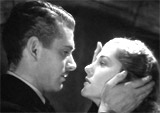 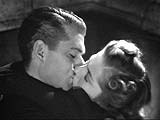
|
|||||||||
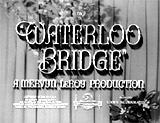
|
Waterloo Bridge (1940)
Director Mervyl LeRoy's touching, melodramatic WWI-era romantic drama (told in flashback) was a monumental tearjerker, in its tale of a doomed romance between two lovers:
The first kiss between them came in the romantic light of the Candlelight Club. They waltzed together to the orchestral sounds of "Auld Lang Syne," as they discovered their fresh new love for each other. Soon after, they made plans to marry, although their circumstances turned tragic when she believed he had been killed during the war. Impoverished, she resorted to street-walking prostitution on London's Waterloo Bridge - and ultimately suicide. |
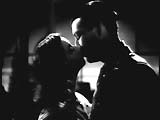
|
|||||||||
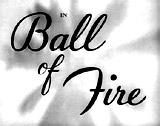
|
Ball of Fire (1941)
This classic Howard Hawks film was often considered an adult version of the legendary Snow White and the Seven Dwarfs tale - and was one of the last "Golden Age" screwball comedies. Scriptwriters Billy Wilder and Charles Brackett adapted co-author Wilder's own story "From A to Z" for the Samuel Goldwyn-produced and RKO-distributed film. Professor Bertram Potts (Gary Cooper), a linguist (or grammarian) was the most youthful, naive, square, pedantic, and innocent of a group of eight elderly, white-haired, conservative-minded bachelor professors ("squirrelly cherubs") who were living together in the same Manhattan house for nine years. Potts was leading the group to write-compile an encyclopedia or dictionary in a 12-year project. Each scholar was a specialist in a particular discipline, subject or study area, and was assigned to write articles based upon their research. Their project was financed by rich investor Miss Totten (Mary Field), who was now insisting that the men finish their leisurely-paced work as soon as possible. As the professors mostly worked in seclusion in the orderly inner environment of the house, tended by housekeeper Miss Bragg (Kathleen Howard), they were very sheltered and unfamiliar with the outside world. During Potts' research into the subject of "Slang," he realized that the article he was working on was completely out-dated and needed revision. This required him to leave the house - he would be the only one to do so in nine years. In a nightclub, he listened to the singing performance of worldly, sexy, smart-mouthed and flirtatious singer-dancer Katherine "Sugarpuss" O'Shea (Barbara Stanwyck), a gangster's moll. Although she initially rejected his invitation to help in his linguistic research into slang (by visiting with him in the scholars' house), she was forced to agree when she found herself on the run from the law, and needed a place to hide. Sugarpuss was a witness to a murder committed by her mob boss boyfriend Joe Lilac (Dana Andrews). The presence of the vivacious and seductive Sugarpuss in the house completely disrupted progress on the encyclopedia, especially when she instructed the men to dance with her in a Conga line. Although she could help with the slang research, Potts asked her to leave since her sexiness threatened his work. She claimed she was in love with him: "I couldn't stop thinking about you after you left my dressing room," and she called him "big and cute and pretty...to me, you're a regular yum-yum type." Also admitting she was "just plain wacky" over him, she proposed to show priggish Potts the meaning of "yum-yum." First, she had to elevate her height by standing on two reference books: "I'm gonna show you what yum-yum is. Here's yum." She kissed him with her arms around his neck. Then, she said: "And here's the other yum" (a second kiss), followed by: "And here's yum-yum." The force of the third kiss caused them to topple backwards onto the floor. Inevitably, Potts fell in love with Sugarpuss and proposed marriage, while at the same time, Joe Lilac also wanted to forcefully marry her, to keep her from testifying against him - of course, various complications ensued. In the ending, Potts proved himself to her by knocking out Lilac and forcefully giving her a passionate "yum-yum" kiss while providing her with three books to stand on: ("Gentlemen, as a grammarian, I know when words cease to be of use. There remains one argument. Come here, dear...Get up, darling...."). |
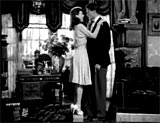 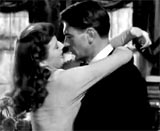 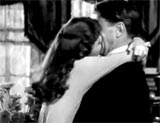  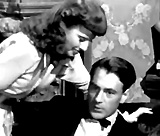 Standing on Books for a "Yum-Yum" Kiss - and Toppling to the Floor   Ending: Final "Yum-Yum" Kiss |
|||||||||
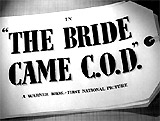
|
The Bride Came C.O.D. (1941)
Director William Keighley's slapstick/screwball comedy was about a runaway heiress, a common theme of 40s films (also It Happened One Night (1934)), starring two Warner Bros' stars in their second and last pairing:
Temperamental Joan was about to marry vain LA nightclub bandleader Allen Bruce (Jack Carson), although her oil baron father Lucius K. Winfield (Eugene Pallette) was opposed to a quicky marriage-elopement to Las Vegas with the fortune hunter. He arranged for a private charter plane service pilot named Steve Collins (James Cagney) to kidnap her and take her to Amarillo, Texas. In return, freight pilot Steve would be paid the freight fare of her weight ($10/pound), helping him to pay off his debts to a finance company and avoid being repossessed. After they made an emergency landing in the desert during the flight and became stranded, their time in the almost-deserted former mining town of Bonanza, California inevitably brought the two together and he saved her from a bad marriage. In the late scene of a mine cave-in, Joan and Steve were both trapped. He went to her as she was preparing for death and reevaluating her life by baring her soul. When she forgave him, he admitted that he wasn't married and that he loved her - and they kissed. She jumped back shrieking: "Mustard!", detecting that he had been secretly eating after finding a cave exit. |
 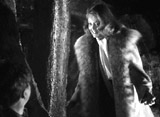 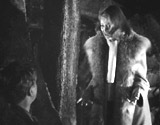
|
|||||||||
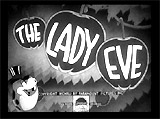
|
This sparkling classic comedy from writer/director Preston Sturges eventually ended with a happy, romantic conclusion to the farcical affair between two mismatched characters:
Their relationship suffered through conflict, deceitfulness, and confusion, although she finally succumbed to love and her Prince Charming. The lovesick and innocent Hopsie had rejected Jean/Lady Eve twice on the grounds of immorality, thinking that the bewitching Englishwoman Lady Eve Sidwich (also Barbara Stanwyck, in an impersonation) was only out to seduce, marry, and dump him. When he accidentally was tripped by Jean Harrington on shipboard - again - he was delighted to again meet her. He suggested that they go to her cabin "or someplace" and he dragged her off and kissed her along the way. At her cabin door, she told him as they kissed and closely embraced:
He replied: "Will you forgive me?" She responded: "For what? Oh, you mean, on the boat. The question is, can you forgive me?" But Charles still didn't understand that Jean had repeatedly duped him (as Lady Eve), and that they were in fact a legally-married couple. He vowed that he loved her no matter what and was finally willing to surrender himself to her:
She slowly closed her door as he still wondered about her resemblance to Lady Eve ("I feel it's only fair to tell you, it never would have happened except she looked so exactly like you"), and weakly protested:
She softly replied that his marital status was fine with her as the door shut: "But so am I, darling. So am I." The film ended with Pike's valet Muggsy (William Demarest) escaping from the room, exclaiming: "Positively the same dame." |
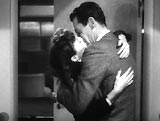 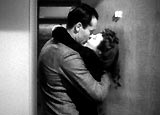 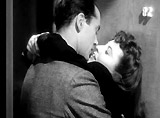 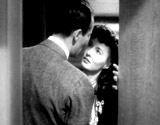
|
|||||||||
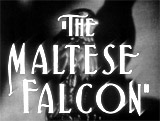
|
Warner Bros and director John Huston (in his directorial debut film) teamed up for this adaptation of a Dashiell Hammett novel about the frenzied search for a fabled bird. Hard-boiled yet laconic detective Sam Spade (Humphrey Bogart) revisited duplicitous, vulnerable-acting femme fatale Brigid O'Shaughnessy (Mary Astor) in her hotel room. Spade wasn't interested in her tantalizing, innocent act and tried to pry more information out of her about the black bird, although he was intrigued by her play-acting:
When he told her he had been offered $5,000 for the bird, she turned to him:
When she sexually quivered: "What else is there I can buy you with?", Spade brutally took her face in his hands and kissed her roughly. He dug his thumbs into her cheeks and she accepted his forceful and lingering kiss. Then he angrily and distrustfully told her:
|
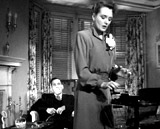 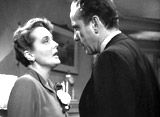 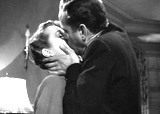 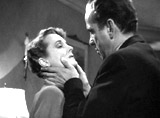
|
|||||||||
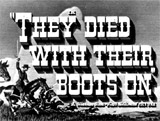
|
They Died With Their Boots On (1941)
Director Raoul Walsh's western, made for Warners, took many liberties with history in its tale of the military career and personal life of an infamous cavalry officer. Before the military leader's courageous and deadly battle at the Little Bighorn, it followed (with many inaccuracies) the lives of:
In the poignant ending, Custer gave a heart-rending farewell goodbye to his wife before leaving for his disastrous meeting with fate at the Battle of the Little Big Horn. She sensed disaster and had written about her fears in her diary (he reacted with astonishment to her written words). The couple shared a few extended looks and kisses. She looked into his eyes as he told her before their final kiss: "Walking through life with you, ma'am, has been a very gracious thing." After he left, she stood against a wall and watched him go - and then collapsed in a faint to the floor, as the camera dramatically pulled back. [Note: It was the stars' final screen pairing also - their final scene together!] |
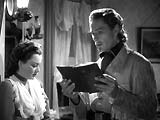 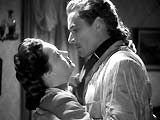 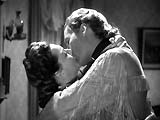 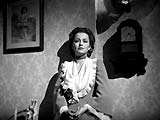
|
|||||||||
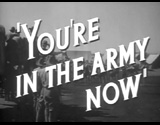
|
You're in the Army Now (1941)
This military-related comedy film by director Lewis Seiler, starring Jimmy Durante, has reportedly the longest kiss in film history (a record held for many years) - at three minutes and five seconds (or 185 seconds), between the film's two romantic leads: Capt. Joe Radcliffe (Regis Toomey) and Bliss Dobson (Jane Wyman), the Colonel's daughter. However, the lengthy kiss was only a myth and never occurred for that length of time. According to many sources and heavily-circulated information, the kiss supposedly set the record for the longest sustained kiss in film history and remained a record-setter. At most, the kissing scene was broken up by several cutaways to Bliss' father, Colonel Dobson (Donald MacBride), and overall, the two kisses lasted only a total of 24 seconds. The first kiss was 10 seconds, and the second was 14 seconds (see below) - it was not a continuous kiss either.
The entire sequence from the time of the Colonel's entry into the house to the fade-out to black (from 24:57 to 26:12) was an elapsed time of 1 minute and 15 seconds, nowhere close to 3 minutes and 5 seconds as reported, even for the complete segment. |
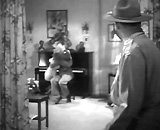 Colonel Entering House 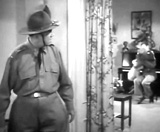 Colonel's Double-Take 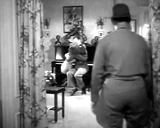 Colonel Returning to Doorway and Clearing Throat 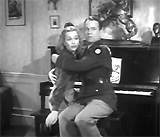 End of the First Kiss (10 seconds duration) |
|||||||||
(in chronological order by film title) Introduction | 1896-1925 | 1926-1927 | 1928-1932 | 1933-1936 | 1937-1939 | 1940-1941 1942-1943 | 1944-1946 | 1947-1951 | 1952-1954 | 1955 - 1 | 1955 - 2 | 1956-1958 | 1959-1961 1962-1965 | 1966-1968 | 1969-1971 | 1972-1976 | 1977-1981 | 1982 1983-1984 | 1985-1986 | 1987 | 1988 | 1989-1990 | 1991 | 1992-1993 | 1994 1995 | 1996 | 1997 | 1998 | 1999 | 2000 | 2001 | 2002 | 2003 | 2004 | 2005 | 2006-2007 | 2008 | 2009- |